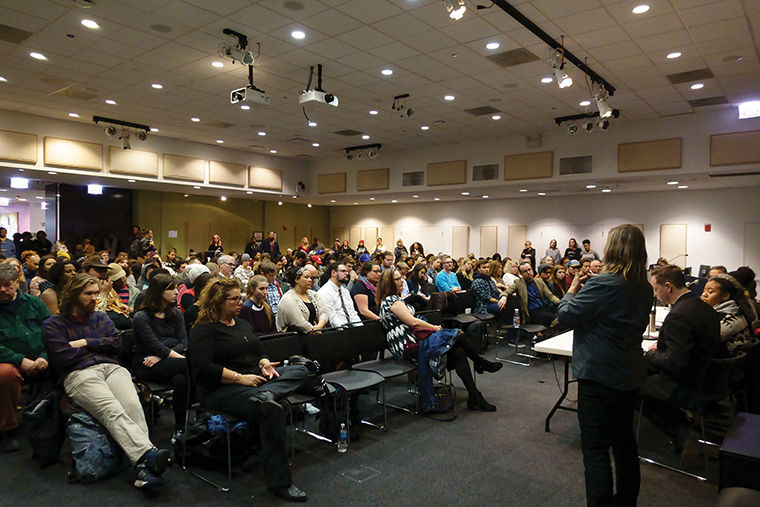Assembly addresses post-election concerns
December 5, 2016

Five panelists, each representing a department or organization from the college, offered students and faculty their perspectives on the 2016 election results at the Nov. 29 College Assembly.
Onye Ozuzu, dean of the School of Fine & Performing Arts, recalled her 7-year-old son crawling into her bed on Election Night and asking whether their family was going to have to leave the country when it became clear Trump was going to win.
Having to address student and faculty concerns about the outcome of the election came soon after the results were final, Ozuzu said she was stumped when asked to create a statement for the school. Though she eventually completed the task, she said she experienced the same struggle for words when asked to act as a panelist in the college Assembly about response to the election.
“I’ve been asked to speak about how we can engage with this through our art practices,” Ozuzu said. “For myself as dancer and choreographer, my initial reaction is, ‘I have no f–king idea.’ It’s really important to sit with [ideas for art] and to not rush out ahead.”
During the assembly, hosted Nov. 29 in Stage Two auditorium in the 618 S. Michigan Ave. Building by the Office of the Provost, five panelists discussed available counseling services, social reform through political activism and overall ideological tolerance. Following the panel, the forum was opened to students and faculty to ask questions and express their opinions about election-related issues.
Stan Wearden, senior vice president and provost, said the election brought up hatred, fear and anger, all of which were previously thought to be diminishing in the U.S. Wearden added that it is important for the campus community to explore political differences without fear of judgment.
“It’s important that we create an environment that is safe for everyone—safe for all people regardless of their political views and regardless of their political ideologies, which I separate from this atmosphere of hate and fear,” Wearden said. “It has nothing to do with a political ideology; it is something much deeper than that.”
Event panelists also included Nicole Spigner, assistant professor in the English Department; Robert Watkins, associate professor in the Humanities, History & Social Sciences Department; and Kaela Ritter, president of the Student Government Association.
The assembly, which was created for faculty, staff and students, followed a Nov. 14 email from President and CEO Kwang-Wu Kim addressing the election results and the “Room for Hope” event created for students on Nov. 17.
Ozuzu said it is important for people to take time to consider what type of impact their artwork will really have on society.
“We’re in a moment where it’s easy for our thoughts and our words to run out ahead of our bodies,” Ozuzu said. “It’s important to stay connected, intellectually and verbally.”
Beverly Anderson, associate dean of Student Health and Support, said although the Student Relations and Counseling Services offices have received only a small amount of students distressed by the election results, supportive services will continue to be offered.
During the panel, Spigner also talked about identifying specific political issues, paying attention to decisions Congress makes and calling local governmental offices to demand change. Spigner added that activism is more effective as a group effort than a solo one.
“If you want to see something changed, there are probably other people who are already working to that end,” Spigner said. “Seek them out, see if you can act with them, see if you can emulate them and see if you can otherwise support them.”
Opportunities for democratic action are not limited to the day of the election, and students should continue to be engaged in politics the entire year, Watkins, who studies political theory, said.
“We have to be alert and defend our democratic institutions and practices against any onslaughts and abuses of power that come their way,” Watkins said.
For Joseph Guritz, a freshman theatre major, unity is crucial during post-election times, he said at the college assembly.
“Now is a time to share love between one another because love is so important,” Guritz said. “Fear is a b—h; fear has brought us to some of the hardest times that we’ve known in our nation and in our world. Looking at the light and going toward it and hoping for a better tomorrow can make a difference.”







